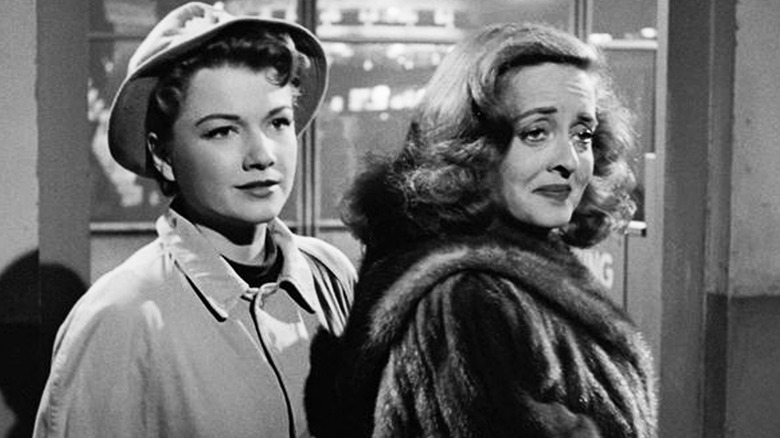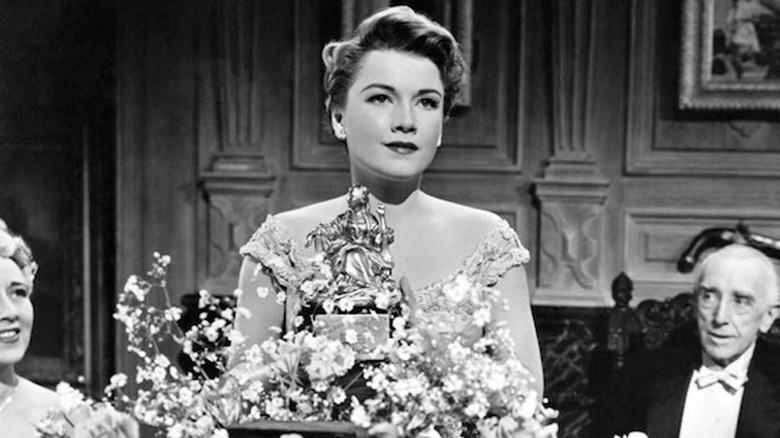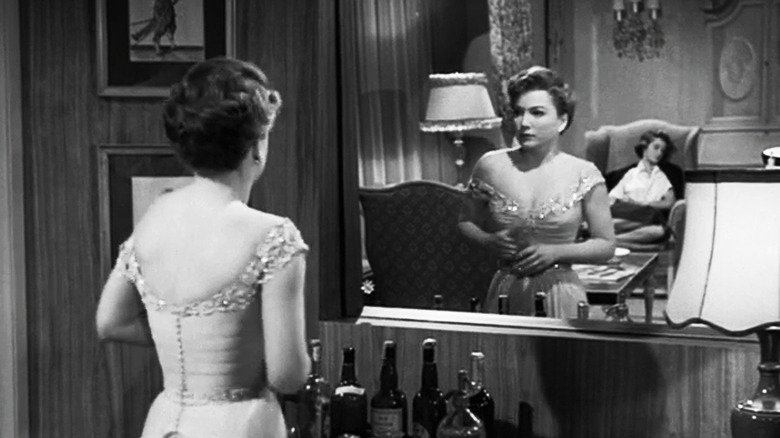All About Eve's Story Needed A Major Change If It Was Going To Be Made Into A Movie
Every truly great film has to start with a great story, and "All About Eve" is no exception. The 1950 film follows the feud between a veteran actress and the titular protege who tries to steal her career — and succeeds in nearly every way that matters. The premise was lifted from a short story written by Mary Orr, "The Wisdom of Eve," which was published in Cosmopolitan in 1946. That too was a juicy story, filled with twists, turns, and no shortage of acerbic wit. And it essentially sells itself, especially for an adaptation on film.
In the late '40s, the story was making the rounds with every major studio in Hollywood — catching the eye of future "All About Eve" director Joseph L. Mankiewicz — but it took three long years to drum up genuine interest in adapting it. It may sound ridiculous now, but "The Wisdom of Eve" was virtually radioactive in its original form, at least to the strict standards of Golden Age Hollywood. It has a very different ending from the film that would eventually take inspiration from it, and if it hadn't been changed, we may never have gotten "All About Eve" as we know it today.
All about that original ending
"All About Eve" follows all the major beats of "The Wisdom of Eve," at least up to a certain point. When Eve Harrington (Anne Baxter) begins to ingratiate herself into the life of actress Margo Channing (Bette Davis), she does so with the intent of usurping her career, her influence, and her reputation in one fell swoop. Her plan even involves the seduction of Margo's boyfriend Bill (Gary Merrill). Fortunately both Bill and Margo more or less see through Eve's façade, which forces her to pivot to Margo's best friend, Karen (Celeste Holm), and her husband Lloyd (Hugh Marlowe).
From here, the two stories begin to take separate paths. In "The Wisdom of Eve," the antagonist manages to seduce Lloyd, a well-known playwright who once wrote starring vehicles for Margo. Eve naturally plans to marry him and take Margo's place as leading lady in all of his plays — and it's a clever plan, one she actually gets away with. By the end of the story, Eve has everything she ever wanted: the wealth, the man, and the career, complete with a ticket to Hollywood. It makes "The Wisdom of Eve" a fascinating cautionary tale, a sort of horror story for working women who were phasing out of their prime. But for Hollywood itself, it was just a touch too bold.
The wisdom of Mankiewicz
Hollywood in the '40s and '50s was a time of intense puritanism. Morality was everything in the films that emerged from the era. No matter what, the good guys always came out on top in the end. "Transgressors — especially women — had to be punished," wrote Sam Staggs in "All About All About Eve." So if Orr's short story was to make its way to the silver screen, there had to be a caveat to Eve's apparent victory. Justice had to be swift and definitive.
Mankiewicz's script does just that. The writer-director wasn't the biggest fan of Hollywood's stiff moral code, but he found his own way to condemn Eve's transgressions against Margo and Karen. In "All About Eve," Eve does succeed career-wise, winning a prestigious stage award and scoring that aforementioned ticket to Hollywood. But she fails to seduce Karen's husband, and instead finds herself ensnared by the theatre critic Addison DeWitt, who — thanks to a little investigating — knows the truth about Eve's shady origins and could tank her career by sharing her secret.
In the end, Margo keeps her man and ages gracefully into a new era of her career. More than that, Mankiewicz makes it clear that karma is coming for Eve. By introducing a young, obsessive fan into her life on the eve (no pun intended) of her big move to Hollywood, "All About Eve" ends with an ironic twist on its beginning. The havoc that Eve brought on Margo's life will soon be visited on hers, making for a poetic, satisfying conclusion that seemed to please everyone involved.


